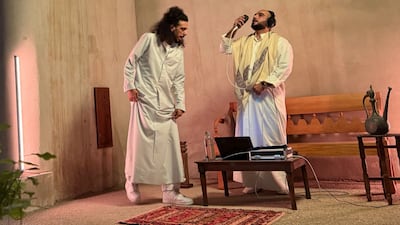It's been two years since the war in Gaza began. Much of the enclave lies in ruins and tens of thousands of people have been killed. But Palestinian creatives persevere, as an act of preservation and defiance.
In Sharjah, Sila: All That is Left to You, a major exhibition showcasing Palestinian tatreez embroidery, is running until January 5 at Maraya Art Centre.
Among those featured is Gazan artist Hazem Harb, who presents a series of UV fine art prints inspired by tatreez designs and a century-old thawb given to him by an elderly woman in Gaza in September 2023, weeks before the war began.
Tattered but still vibrant, the garment was stitched together from scraps of embroidery from across Gaza, Nablus and Ramallah.
Harb initially assumed the piece was an expression of unity, compiling diverse Palestinian tatreez motifs. The back story, however, was more poignant.
“She had made it out of poverty,” Harb says. The patchwork was not a poetic gesture, but crafted out of need. However, the elderly woman recognised its significance and gave it to the artist in the hope that it would end up in a museum.

Harb's work is only one example of the exhibition's many standout pieces. These also include striking new designs by Palestinian textile artist Areen Hassan, Palestinian-Canadian visual artist Samar Hejazi and Lebanese furniture designer Nada Debs.
Co-curator Cima Azzam tells Razmig Bedirian: “Things are being erased in real time in front of our eyes in Gaza. It's almost as though, like the people, we are running against time, rushing against time, to withhold and hold on to these histories and culture.”
And while exemplary work from Gazan artists finds an increasing audience abroad as solidarity grows, many cannot stand alongside their creations.
A number of contributors to the book Daybreak in Gaza, for example, which we featured several weeks ago, did not survive to see their work published.
“We were fast, because we had to write as fast as Israel has been killing people, literally,” says Mahmoud Muna, a bookseller from Jerusalem who is one of the editors.

And others, such as 24-year-old writer Yahya Al Hamarna, watched his publishers celebrate the release of his first poetry collection via Zoom, from a displacement tent in Gaza.
“The bombing cuts short every idea before it is complete,” he says. “Sometimes I wrote on torn paper, other times on my small phone by candlelight. But this just reminded me that writing is not a luxury, it’s a necessity.
“I was writing to remember that I was alive – and to prove that a voice can emerge, even from under the rubble.”
And the release of vital new works continues. Love is Resistance, an art book for Palestine with pages designed to be torn out and used as protest posters, is coming out later this month, featuring contributions from figures ranging from Samia Halaby to Massive Attack.
The plight of the Palestinian people did not begin during this war – and even now, nearly 80 years since the Nakba, they endure. So too does their art and culture, sustained by the indefatigable power of their resilience.
'What a year of listening taught me about mental health in music'
For the past year, as part of his Rosalynn Carter Fellowship for Mental Health Journalism, Saeed Saeed has worked on a project to understand how musicians in the Arab world are using their work to talk about mental health.
One example is Palestinian-Jordanian rapper Laith Al Husseini, known as The Synaptik, who says music became his way of keeping it together while living through the Israel-Gaza war. Speaking from Ramallah, he describes the feeling of releasing his album Al Taman while welcoming new life amid mass fatalities.
“Ever since the war, I have been staying home with the family. You cannot move more than five kilometres. But despite all that, I feel deeply happy inside because I have my first-born son here with me,” he reflects. “I move between fear and loss, and then this sense of inner peace and hope.”
For Saeed, many of these exchanges felt a little like therapy sessions rather than interviews. Artists spoke slowly, with pauses that did not need to be filled, moments you can hear in some of the episodes featuring them on The National's podcast, Tarab.
Ahead of World Mental Health Day on Friday, Saeed reflected on what he learnt, which you can find here.
Ala Younis maps history and power in Abu Dhabi show
The individual components in Ala Younis’s works are small – tin soldiers, dioramas, archival documents – but the way they come together, as a constellation of stories threading personal, societal and historical narratives, is monumental.
The Kuwaiti-born Jordanian artist has a solo exhibition at the New York University Abu Dhabi Art Gallery. Titled Past of a Temporal Universe, the exhibition brings together two decades of work and can be considered a mid-career retrospective.
Younis draws from her background as an architect to build sprawling works that often reference landmark modernist structures as a departure point.
From Egypt’s High Dam to the Le Corbusier-designed Baghdad Gymnasium, Younis begins drawing an archival trail, citing films, music, video footage and literature, revealing historical perspectives that alternate between the minute and anecdotal to sweeping ones ingrained in the region’s collective consciousness.
“The way we decided to organise the exhibition is not chronologically, but in thematic groupings,” says Maya Allison, founding director of the Art Gallery and chief curator at NYU Abu Dhabi.
Find more here.
Dates for your diary
- Andre Rieu at Etihad Arena, Abu Dhabi – October 18
- Stereophonics at Coca-Cola Arena, Dubai – October 29
- Amr Diab at Coca-Cola Arena, Dubai – November 1
Other highlights
The National produces a variety of newsletters across an array of subjects. You can sign up here. To receive The Editor's Briefing, our Editor-in-Chief's weekly newsletter – exclusive to registered readers – that rounds up the top stories of the week, sign up here.





